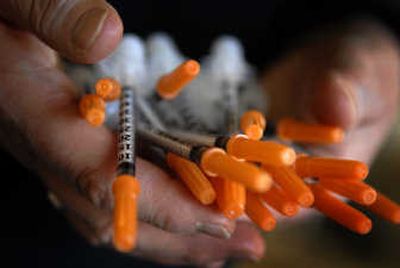This column reflects the opinion of the writer. Learn about the differences between a news story and an opinion column.
Doug Clark: Needle swap center in need of good home

The low-income residents of the Otis Hotel. The venerable Handy Market. A custom trophy shop …
The news has been buzzing lately about the people and enterprises being displaced by the gentrification of Spokane’s seedy West First district.
But under the radar is another longtime institution that is being sent packing by the pressures of urban makeover.
I’m talking about the Outreach Center, 1103 W. First. Operated by the health district, the shabby storefront has a unique purpose.
This is where Spokane’s drug addicts go on weekdays to swap dirty hypodermic needles for clean ones.
How big is Spokane’s injection drug problem?
You’d better sit down.
Last year the Outreach Center exchanged 528,703 needles. The single day trade-in record is 6,004 syringes.
Which took place in two hours.
These days, however, the sad souls who frequent the center are receiving maps along with their “fresh points,” antibiotic ointment, condoms, cookies and other free miscellaneous items.
The maps direct travelers to the Spokane Regional Health District building, that imposing turreted structure located north across the river on College Street. An office in the building’s southwest corner will be the new Outreach Center home as of Sept. 17.
Why should you care?
Because relocating the center may wind up costing taxpayers a lot of money.
The Outreach Center’s mission is to prevent disease and promote safety. Don’t get the wrong idea. Nobody, let alone health workers, wants to see human beings pumping illegal drugs into their veins.
But addicts do what addicts do. They shoot up dope.
When dirty needles are shared, some users get Hepatitis C or HIV. And then we pay the freight for months and years of costly health care.
“What we save the community is an astounding amount of money, not to mention the humanity,” says Lynn Everson, a public health worker who is a living legend on the seamy streets of Spokane.
For the last 18 years, Everson has been a nonjudgmental presence to the city’s drug-addicted, prostitutes and disenfranchised.
Disagree with her liberal-mindedness, if you will. Just don’t question her commitment.
“Can you think about being homeless or being a drug addict and having every day be a drama?” she added.
These people “didn’t grow up having a life goal of being a drug addict, working in prostitution or being homeless.”
Everson fears that some addicts will be reluctant to patronize the new stark and formal setting. “It’s difficult for our clients to come into a big institution because, historically, institutions have not been particularly kind to them.”
The solution would be for some good-hearted downtown building owner to offer the program a five-year lease at $500 a month. Everson’s not picky: “I’ve lived with sewage, cockroaches and mice.”
If you’re in need of a reality check, the Outreach Center is a great place to get one.
The other day I sat behind the center’s makeshift counter and watched the transactions take place.
Mitchell, a fast-talking 40-year-old, dropped his dirty needles into a red plastic canister. “This is a vital place,” he said as he accepted a new supply.
Danny, 41, walked in a few minutes later. He told a story about once exchanging 1,300 needles for himself and friends.
“I like to see people using new ones,” he said. “If they’re gonna be doing it, do it right.”
On and on they came: A twitchy, sweating man who kept mopping his face; a scrawny woman who had her kids taken away after a drug bust; a silent bearded man.
Then in this depressing setting, a glimmer of hope walked through the door.
His name is George. He is 23 and baby-faced, with multiple tattoos and a punk-rocker’s version of a Mohawk haircut.
He was leaving Spokane the next day for California, he said, where a job and rehab await.
“I’m gonna kick,” said George. “I don’t want to live my life this way anymore. I miss not being able to wake up without throwing up. It’s hard to sleep.
“My life just revolves around this.”
George told his story, how he was boozing in middle school and doing coke and heroin in high school.
I gave George my telephone number and told him to let me know how he does.
I told him I hope he makes it.
It wasn’t much, but in the world of addiction, sometimes hope is all there is.
Doug Clark is a columnist for The Spokesman-Review. He can be reached at (509) 459-5432 or at dougc@spokesman.com.